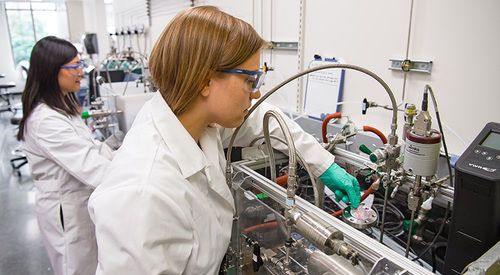
Awards nearly double from just over 10 years ago
The University of Notre Dame has received $138.1 million in research funding for fiscal year (FY) 2017, surpassing the previous record of $133.7 million set in FY 2015. Additionally, the University also broke its monthly record receiving $27.6 million in June alone.
“Our scholarly, robust faculty can take pride in this milestone,” said Rev. John I. Jenkins, C.S.C., the University’s president. “It advances Notre Dame’s reputation as a national research university, and it represents a welcome infusion of spending in South Bend. Congratulations to Robert Bernhard, our vice president for research, and most of all to our talented and hardworking faculty for an achievement that is all the more remarkable in a time of government retrenchment.”The University of Notre Dame has received $138.1 million in research funding for fiscal year (FY) 2017, surpassing the previous record of $133.7 million set in FY 2015. Additionally, the University also broke its monthly record receiving $27.6 million in June alone.
Approximately 57.8 percent of the research awards came from federal funding, while 26.9 percent came from foundations or other sponsors, and 15.3 percent came from industry.
Notre Dame’s continued commitment to growing and expanding its research programs is paying off locally as well, with approximately 75 percent of external research funds expended in the local community. For example, the Notre Dame Turbomachinery Laboratory (NDTL), which opened in downtown South Bend’s Ignition Park in 2016, continues to grow and bring benefits to the area. In FY 2017, NDTL brought in nearly $7 million in research awards. Further, it has hired over 40 employees — recruiting technical experts from both the Michiana region as well as internationally — and has plans to continue to grow its staffing levels.
The community theme continues in a number of other large research grants to the University, including a $1.6 million award from the Lilly Endowment to the Department of Theology to study sacred music in the revival of the community and the church, as well as nearly $1 million to the Department of Physics to continue its Quarknet program.
Speaking about the record-breaking year, Bernhard said, “This year’s success is tied directly to the dedication of our faculty who worked harder than ever in this difficult funding environment to compete for grants. In fact, Notre Dame researchers submitted over 1,200 proposals this year, representing a 30 percent increase in proposal value since last year. I look forward to seeing many of these proposals — especially those that continue our important collaborative relationship with the city of South Bend, such as the Wireless Institute’s proposal for a city-scale platform for advanced wireless research — become actively funded research projects.”
Among some of the largest awards to each College and School:
- A $6.7 million grant from the Microelectronics Advanced Research Corporation and the Defense Advanced Research Projects Agency (DARPA) to the College of Engineering for continued support of the Center for Low Energy Systems Technology.
- A $2.5 million award to the College of Science from the National Institutes of Health for continued support of VectorBase, a bioinformatics resource for invertebrate vectors of human pathogens.
- A $1.6 million grant from the John Templeton Foundation to the College of Arts and Letters for training Catholic thought leaders to engage in dialogue between science and religion.
- More than $1 million from the U.S. Department of State to the Keough School of Global Affairs for the Peace Accords Matrix.
Faculty from the University’s other Colleges and Schools, as well as Centers and Institutes, contributed to the record-breaking total, which grew from $71 million in 2006.
Contact: Jessica Sieff, 574-631-3933, jsieff@nd.edu